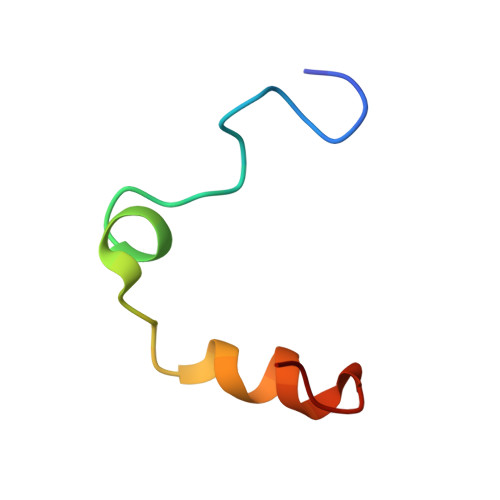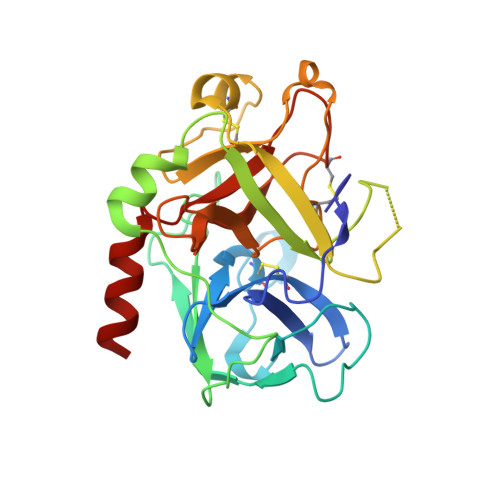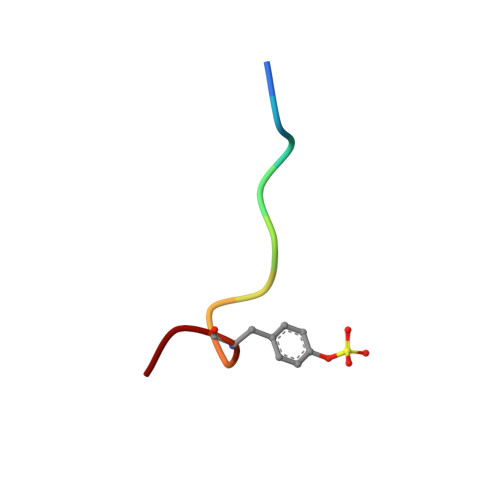Engineering inhibitors highly selective for the S1 sites of Ser190 trypsin-like serine protease drug targets.
Katz, B.A., Sprengeler, P.A., Luong, C., Verner, E., Elrod, K., Kirtley, M., Janc, J., Spencer, J.R., Breitenbucher, J.G., Hui, H., McGee, D., Allen, D., Martelli, A., Mackman, R.L.(2001) Chem Biol 8: 1107-1121
- PubMed: 11731301
- DOI: https://doi.org/10.1016/s1074-5521(01)00084-9
- Primary Citation of Related Structures:
1GJ4, 1GJ5, 1GJ6, 1GJ7, 1GJ8, 1GJ9, 1GJA, 1GJB, 1GJC, 1GJD - PubMed Abstract:
Involved or implicated in a wide spectrum of diseases, trypsin-like serine proteases comprise well studied drug targets and anti-targets that can be subdivided into two major classes. In one class there is a serine at position 190 at the S1 site, as in urokinase type plasminogen activator (urokinase or uPA) and factor VIIa, and in the other there is an alanine at 190, as in tissue type plasminogen activator (tPA) and factor Xa. A hydrogen bond unique to Ser190 protease-arylamidine complexes between O gamma(Ser190) and the inhibitor amidine confers an intrinsic preference for such inhibitors toward Ser190 proteases over Ala190 counterparts. Based on the structural differences between the S1 sites of Ser190 and Ala190 protease-arylamidine complexes, we amplified the selectivity of amidine inhibitors toward uPA and against tPA, by factors as high as 220-fold, by incorporating a halo group ortho to the amidine of a lead inhibitor scaffold. Comparison of K(i) values of such halo-substituted and parent inhibitors toward a panel of Ser190 and Ala190 proteases demonstrates pronounced selectivity of the halo analogs for Ser190 proteases over Ala190 counterparts. Crystal structures of Ser190 proteases, uPA and trypsin, and of an Ala190 counterpart, thrombin, bound by a set of ortho (halo, amidino) aryl inhibitors and of non-halo parents reveal the structural basis of the exquisite selectivity and validate the design principle. Remarkable selectivity enhancements of exceptionally small inhibitors are achieved toward the uPA target over the highly similar tPA anti-target through a single atom substitution on an otherwise relatively non-selective scaffold. Overall selectivities for uPA over tPA as high as 980-fold at physiological pH were realized. The increase in selectivity results from the displacement of a single bound water molecule common to the S1 site of both the uPA target and the tPA anti-target because of the ensuing deficit in hydrogen bonding of the arylamidine inhibitor when bound in the Ala190 protease anti-target.
- Axys Pharmaceutical Corporation, 385 Oyster Point Boulevard, South San Francisco, CA 94080, USA. brad_katz@axyspharm.com
Organizational Affiliation:





















